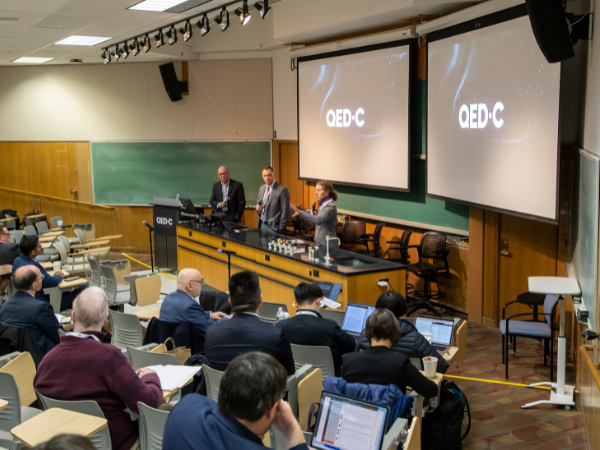Author: Hilary Kaye/HKA
Topics pertaining mostly to the business of being an emerging quantum company dominated the first QED-C plenary meeting of 2024, spread over two days on the beautiful Northwestern University campus in Evanston, IL. Federal funding opportunities, navigating trade programs, working with national labs, protection from cyber and insider threats, communicating science to non-scientific audiences and quantum hiring trends were high-interest topics, along with a preview of the new QED-C report “Quantum Computing for Transportation & Logistics.”
While traditional quantum gatherings focus mostly on technology R&D, including roadmaps, milestones and innovations, the QED-C plenary meetings are designed to provide immediately useful information to its members, in addition to excellent networking opportunities with colleagues and new acquaintances.
A recording of the sessions is now available to members HERE. For members and non-members who would like a quick recap of highlights, read on . . .
- ARPA-E Program Director Bob Ledoux reported that his agency considers quantum chemistry to be central to most aspects of energy R&D. ARPA-E is planning a new program focused on quantum computing for addressing diverse energy challenges. He encouraged QED-C members to get involved. Contact Bob at Robert.ledoux@hq.doe.gov if interested in the April 29-30 ARPA-E workshop in Washington D.C., “Quantum Computing for Energy Innovation.”
- David Awschalom, Director of Q-NEXT, which is one of five DOE Quantum Information Science (QIS) research centers, shared information about various programs. In partnership with the other centers, Q-NEXT is sponsoring a QIS Summer School, July 15 – 26, at Oak Ridge National Laboratory. The graduate-level curriculum is aimed at graduate, undergrad and early-career scientists seeking hands-on experience in a laboratory setting.
- Strategic federal investments were presented by the director of the recently launched Dept. of Defense Office of Strategic Capital (OSC), Christopher Lehman, and Tom Smith of the Small Business Administration (SBA). Working together, the OSC and SBA are engaging with private capital investors to provide loans and loan guarantees that strengthen critical supply chains needed for national security. The OSC Investment Strategy names Quantum Science as one of the critical technology areas of focus. As moderator, Celia Merzbacher noted that many of QED-C’s smaller companies would be interested in more info on these funding opportunities HERE.
- Another key topic was trade, with remarks by the U.S. Dept of Commerce Deputy Assistant Secretary of Trade for Manufacturing, Heather Evans and a lively panel of representatives from International Trade Administration (ITA) and Bureau of Industry and Security (BIS). QED-C members were encouraged to contact Heather, or a representative in their region, to gather more information for their companies.
- Representatives from three regional innovation networks discussed advantages of their own regions: Elevate Quantum (Colorado and Mountain West states), Bloch Tech Hub (led by Chicago Quantum Exchange) and the Northwest Quantum Nexus (University of Washington). All extolled the virtues of their own regions yet agreed collaboration will be more productive than competition.
- Hiring trends in the quantum ecosystem was another area of exploration, with Meredith Fore from Chicago Quantum Exchange noting that jobs requiring PhDs are trending down, while jobs requiring only bachelor’s degrees are up. The jobs aren’t necessarily entry level, but it was encouraging that more positions are open at levels below the doctorate degree.
- Roahn Wynar, FBI, gave an update on cybersecurity threats as well as insider threats. He referenced the increasing need to protect data from threats from China, along with insider damage caused by “brokers and middlemen” that have unprotected access. A panel of three cybersecurity service providers rounded out the discussion with details on protection.
- A panel led by Director of Dept of Defense Microelectronics Commons (MEC) program Stephanie Lin and MEC Tech Execution Areas Lead for Quantum Mike Fanto from the Air Force Research Lab (AFRL) featured representatives from the MEC Hubs that were recently selected and are in the process of launching. The hubs are to provide access to prototyping capabilities for quantum technologies.
- Communicating quantum topics to policymakers and other non-scientists was a popular panel, with many questions from the audience. Led by Christina Willis of Infleqtion, panelists from the Chicago Quantum Exchange, University of Chicago and Infleqtion explained how they evolved into their roles as science communicators and the importance of companies being able to communicate in understandable language.
- A preview was given of the just-released report “Quantum Computing for Transportation & Logistics” which resulted from a QED-C Use Cases Technical Advisory Committee workshop. Panelists at the plenary meeting discussed near-term T&L use cases involving quantum computing, with these four areas having the greatest near-term impact: optimization of labor plans, continuous route optimization, optimization of warehousing and demand forecasting.
- The final session of the plenary meeting was devoted to emerging players, with a live Quantum Marketplace moderated by Mark Wippich. Duality Accelerator Executive Director Ezunial Burts was joined by five quantum companies that were part of the Duality program, providing updates to their growth and tributes to the value of Duality. Companies represented were QuantCAD, Icarus Quantum, Great Lakes Crystal Technologies, qBraid and memQ.
- Quantum students in the Chicago area also had an illuminating experience at the plenary meeting, with a poster session, speed mentoring, practice communicating research to non-scientist audiences, and access to the topics discussed by the plenary speakers.


